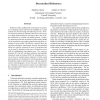1612 search results - page 195 / 323 » About models of security protocols |
CCS
2011
ACM
13 years 10 months ago
2011
ACM
We consider security properties of cryptographic protocols that can be modeled using the notion of trace equivalence. The notion of equivalence is crucial when specifying privacy-...
96
Voted
CORR
2010
Springer
14 years 10 months ago
2010
Springer
In secure multi-party computation n parties jointly evaluate an n-variate function f in the presence of an adversary which can corrupt up till t parties. All honest parties are req...
CSFW
2006
IEEE
15 years 4 months ago
2006
IEEE
Robustness links confidentiality and integrity properties of a computing system and has been identified as a useful property for characterizing and enforcing security. Previous ...
DEON
2008
Springer
14 years 12 months ago
2008
Springer
The security policy of an information system may include a wide range of different requirements. The literature has primarily focused on access and information flow control require...
96
Voted
CCS
2007
ACM
15 years 4 months ago
2007
ACM
As computing models change, so too do the demands on storage. Distributed and virtualized systems introduce new vulnerabilities, assumptions, and performance requirements on disks...

